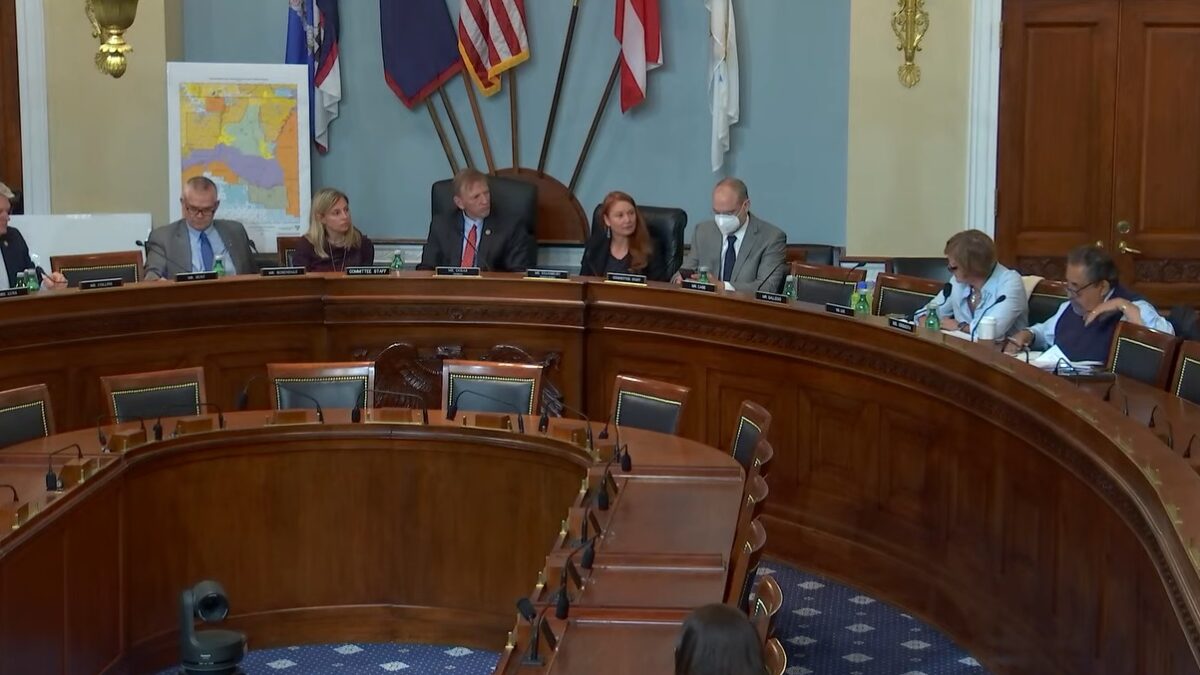Democrats on the House Natural Resources Committee illustrated a blatant misunderstanding of the purpose behind Wednesday’s hearing on land management rules while also showing they don’t understand the point of representative government.
House Republicans offered a platform to key stakeholders Wednesday to hear from those most likely to face severe consequences from a sweeping new proposal from the Bureau of Land Management (BLM).
In March, the BLM unveiled new rules to establish “conservation leases” within the framework of the Federal Land Policy Management Act of 1976. The nearly 50-year law stipulates that federal lands must be managed under a “multiple-use mandate,” ensuring that public property is available for a wide range of activities, from mining to grazing. The new rules, however, threaten to unilaterally eliminate the multiple-use doctrine at the direction of unelected bureaucrats. Wyoming rancher and State Senator Brian Boner told The Federalist the proposal would be “detrimental” to any rancher who grazes on BLM land.
[READ: New BLM Rules On ‘Conservation Leases’ Will Fundamentally Transform Public Land Management]
Lawmakers Wednesday heard testimony from a panel of four witnesses from western states where the rules will have the most impact. Of the 245 million acres managed by the BLM, more than 90 percent lie in the nation’s 12 western states. Republicans brought forward Montana Prairie County Commissioner Todd Devlin, Nevada Director of Agriculture J.J. Goicoechea, and Arizona Mohave County Supervisor Chairman Travis Lingenfelter to testify on the agency proposal. Democrats called New Mexico Public Land Commissioner Stephanie Garcia Richard as the minority witness and then hammered the absence of senior leadership from the Department of the Interior.
“I will note as we’re getting started on this hearing that this is an Oversight hearing over primarily a BLM rule, and I think it’s noticeable to note that BLM is actually not present in the room because they were not invited,” said New Mexico Rep. Melanie Stansbury in her opening remarks. “While it’s important to hear from our communities, I think in our Oversight role, it’s important to hear from the agencies themselves.”
The BLM’s absence from Wednesday’s hearing became a primary talking point among Democrats on the committee. Natural Resources Oversight Subcommittee Chairman Paul Gosar of Arizona was quick to remind the ranking member that BLM Director Tracy Stone-Manning appeared before the committee last week.
“They were here last week,” Gosar said, adding if they had come back, the committee “would have held a second panel.”
Nevada Democrat Congresswoman Susie Lee opened her remarks by declaring she was “perplexed” by the absence of senior Interior leadership “if it was so important to hear from them today.”
Montana Republican Congressman Matt Rosendale offered Lee an immediate response.
“It’s important to hear from the communities,” Rosendale said. “We already know what the director and the secretary, what their initiative is. We know what their agenda is.”
Lee reclaimed her time as Rosendale prepared to lash out at the BLM hearing schedule omitting Montana from the calendar. Of the five two-hour meetings scheduled, two are virtual, and three are held in urban centers: Denver, Reno, and Albuquerque. Not one is held in a state with a Republican senator or majority-GOP House delegation. Republicans on the Natural Resources Committee demanded the BLM extend its public comment period and hold more public meetings among constituents in rural areas.
Wednesday’s hearing brought stakeholders to Washington that the Biden administration is prepared to ignore. While the BLM headquarters remain in Grand Junction on Colorado’s western slope, the agency’s senior leadership was moved back to D.C. by Interior Secretary Deb Haaland.
Wyoming State Senator Boner told The Federalist he believes the rules came straight from the capital.
“This is coming out of D.C.,” Boner said. If state and local governments “have been involved,” Boner added, “they certainly haven’t been discussing it with anybody here locally.”
The panel of witnesses who testified Wednesday warned the new rules from the BLM threaten to wreak havoc on development and conservation in the American West while disrupting the Western way of life. Dr. Goicoechea cautioned that allowing lands to be managed from multiple-use to non-use “have the potential to compromise ecosystem health.”
“Agriculture is conservation,” Goicoechea said. “If grazing is [removed] from these landscapes, ranches will go under, landscapes will be taken over by invasive species and will burn. Wildlife will suffer and [] multiple use will become impossible.”
“Quite frankly, when you’re not at the table, you can’t help but feel that you’re on the menu,” Goicoechea said.
While Republicans warned of aggressive land grabs, Democrats celebrated the presidential use of the 1906 Antiquities Act at the 90-minute hearing. The law was to serve as an emergency lever for administrations to preserve delicate cultural artifacts and relics with the “smallest area compatible” with objects being protected. Recent Democratic presidents, however, have abused the century-old law to create quasi-national parks without congressional approval. In 2021, President Joe Biden reinstated the Obama-era boundaries for a pair of national monuments in Utah to protect an area larger than the boundaries of Zion and Bryce Canyon national parks combined.
[READ: Why Joe Biden’s Expansion Of Bears Ears National Monument Is An Aggressive Land Grab]
“These are placed that are not only sacred and important, [but] they are part of the iconic landscapes that define us as a country,” said Rep. Stansbury. “The Antiquities Act is a crucial land management tool to help ensure that we’re able to protect these lands.”
Abuse of the Antiquities Act, however, reveals the BLM’s true intentions to lock up land with the agency’s latest rules elevating “conservation leases.”








